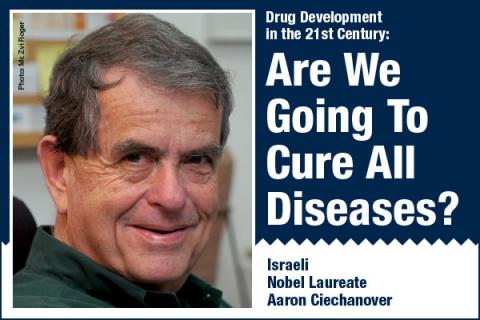event
Distinguished Lecture: Nobel Laureate Aaron Ciechanover
Primary tabs
“Drug Development in the 21st Century: Are We Going to Cure all Diseases?”
Aaron Ciechanover
Cancer and Vascular Biology Research Center, Faculty of Medicine
Technion-Israel Institute of Technology
Date: Tuesday, Oct. 4, 2011
Time: 6:30 p.m. (pre-lecture reception with refreshments begins at 6 p.m.)
Location: Georgia Tech College of Management
800 West Peachtree Street NW
Atlanta, GA 30308
No charge to attend, but RSVPs are requested. Click here to RSVP.
Click here for directions & parking information for the College of Management.
Abstract
Many important drugs such as penicillin, aspirin or digitalis, were discovered by serendipity - some by curious researchers who accidentally noted a "strange" phenomenon, and some by isolation of active ingredients form plants known for centuries to have a specific therapeutic effect. Other major drugs like statins were discovered using more advanced technologies, such as targeted screening of large chemical libraries. In all these cases, the mechanisms of action of the drug were largely unknown at the time of their discovery, and were unraveled only later. With the realization that patients with apparently similar diseases at diagnosis – breast or prostate cancer, for example - respond differently to treatment, and the clinical behavior of the disease is different in different patients, we have begun to understand that the molecular basis of what we thought is the same disease entity, is different. Thus, breast cancer or prostate cancer appear to be sub-divided to smaller classes according to their molecular characteristics. As a result, we are exiting the era where our approach to treatment of these and many other diseases is “one size fits all”, and enter a new one of “personalized medicine” where we shall tailor the treatment according to the patient’s molecular/mutational profile. Here, unlike the previous era, the understanding of the mechanism will drive the development of the new drugs. This era will be characterized initially the development of technologies where sequencing and data processing of individual genomes will be fast (few hours) and cheap (<US$ 1,000), by identification and characterization of new disease-specific molecular markers and drug targets, and by design of novel, mechanism-based drugs to modulate the activities of these targets. It will require a change in our approach to scientific research and development and to education, where interdisciplinarity will domineer and replace in many ways the traditional, discipline- oriented approach. Entry into this era will be also accompanied by complicated bioethical problems, where detailed genetic information of large populations in developed countries will be now available, and protection of privacy will become a major problem to health authorities.
Speaker Bio
A native of Haifa, Professor Ciechanover received his Master of Science in 1970 and his M.D. in 1975 from the Hadassah Medical School of the Hebrew University in Jerusalem. He received his doctorate in medicine in 1981 from the Technion, and has been a Distinguished Research Professor at the Center for Cancer and Vascular Biology and the Director of the Rappaport Family Institute for Research in Medical Sciences at the Technion.
In 2004, he shared the Nobel Prize for Chemistry with Professor Avram Hershko and Professor Irwin Rose for the discovery of ubiquitin-mediated protein degradation, a mechanism by which the cells of most living organisms cull unwanted proteins. Besides being awarded the Nobel Prize, Professor Ciechanover shared the pretigious Albert Lasker Award for Basic Medical Research, the second most prestigious prize in life sciences and medicine, and the Israel Prize, the highest recognition bestowed by the State of Israel. Among many esteemed bodies, he is a member of the Israeli National Academy of Sciences and Humanities, the Pontifical Academy of Sciences of the Vatican and the American Philosophical Society.
Groups
Status
- Workflow status: Published
- Created by: Mike Terrazas
- Created: 08/30/2011
- Modified By: Fletcher Moore
- Modified: 10/07/2016
Categories
Keywords

